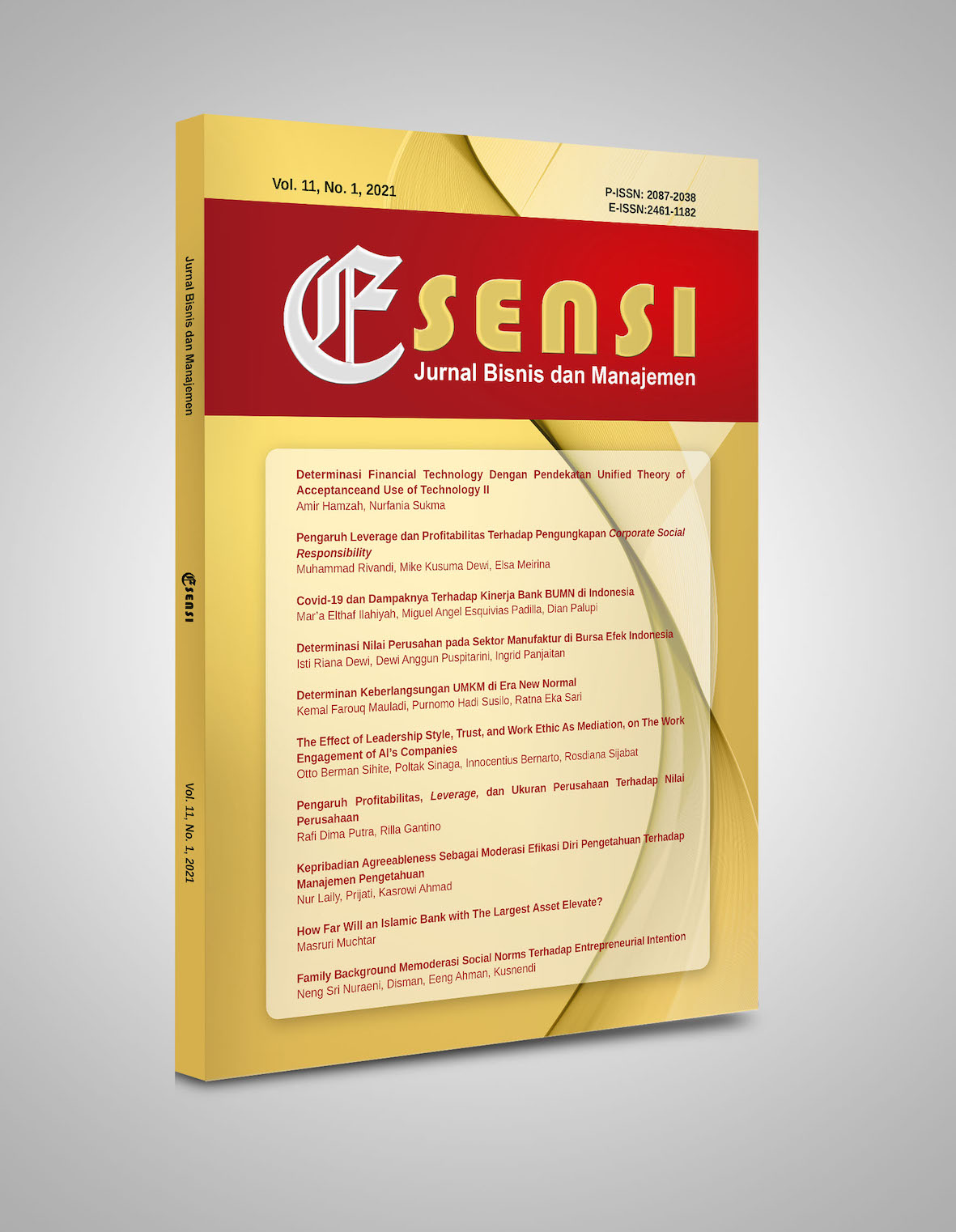Covid-19 dan Dampaknya Terhadap Kinerja Bank BUMN di Indonesia
DOI:
https://doi.org/10.15408/ess.v11i1.19297Keywords:
covid-19, performance, state-owned bankAbstract
Covid-19 has increased the risk of financial institutions. As countries struggle to strengthen economic activity and provide various fiscal stimuli to facilitate liquidity in the market, this study questions whether national banks are still in a healthy condition to face uncertainties in the market. This study applies the RGEC (Risk Profile, Good Corporate Governance, Earnings, and Capital) approach to assess the performance of state-owned banks in Indonesia during the new normal period since June 2020 (quarter II and III). Based on the analysis and discussion of this study, it can be concluded that the condition of state-owned banking in Indonesia during the new normal period was still healthy. Bank risk level remains at a safe level. Bank made huge profits and fixed capital is still at a healthy level. Thus, state-owned banks remain competitive and handle risk well. This is supported by the existence of stimulus assistance from the government in the form of the Countercyclical Policy.
Cara Mengutip:Ilahiyah, M. E., Padilla, M. A. E., & Palupi, D. (2021). Covid-19 dan Dampaknya Terhadap Kinerja Bank BUMN di Indonesia. Esensi: Jurnal Bisnis dan Manajemen, 11(1), xx-xx. https://doi.org/10.15408/ess.v11i1.19297.
References
Arikunto, S. (2014). Prosedur Penelitian Suatu Pendekatan Praktik. Jakarta: Rineka Cipta.
Djalante, R., Lassa, J., Setiamarga, D., Sudjatma, A., Indrawan, M., Haryanto, B., Mahfud, C., Sabaruddin, M., Djalante, S., Ra, I., Adi, L., Ayu, G., Surtiari, K., & Warsilah, H. (2020). Progress in Disaster Science Review and analysis of Current Responses to COVID-19 in Indonesia : Period of January to March 2020. Progress in Disaster Science Journal, 6. https://doi.org/10.1016/j.pdisas.2020.100091.
Dong E., & Du H, G. L. (2019). An Interactive Web-based Dashboard to track COVID-19 in real time. Lancet Infect Disease, 3099, 1–13.
Flögel, F., & Gärtner, S. (2020). The COVID-19 Pandemic and Relationship Banking in Germany: Will Regional Banks Cushion an Economic Decline or is A Banking Crisis Looming? Tijdschrift Voor Economische En Sociale Geografie, 111(3), 416–433. https://doi.org/10.1111/tesg.12440.
Handayani, S., & Mahmudah, H. (2020). Analisis Tingkat Kesehatan Bank Dengan Metode RGEC: Studi Kasus Bank Milik Pemerintah Terdaftar Di BEI Periode 2014-2018. Jurnal Sains Sosio Humaniora, 4(2), 423–439. https://doi.org/10.22437/jssh.v4i2.10875.
Jaya, I. (2018). Analisis Tingkat Kesehatan Bank Dengan Metode RGEC Pada Bank Umum BUMN Yang Terdaftar di Bursa Efek Indonesia Tahun 2014-2016. Jurnal EBBANK, 9(1), 32–52.
Junusi, R. E. (2020). Digital Marketing During the Pandemic Period: A Study of Islamic Perspective. Journal of Digital Marketing and Halal Industry, 2(1), 15–28.
Kansil, K., Pelleng, F. A. O., & Rogahang, J. J. (2020). Analisis Kinerja Keuangan untuk Menilai Kesehatan Bank Rakyat Indonesia dengan Metode Rgec. Productivity, 1(3), 291–296.
Korzeb, Z., & Niedziółka, P. (2020). Resistance of Commercial Banks to The Crisis Caused by the COVID-19 Pandemic: The Case of Poland. Equilibrium, 15(2), 205–234. https://doi.org/10.24136/eq.2020.010
Li, L., Strahan, P. E., & Zhang, S. (2020). Banks as Lenders of First Resort: Evidence from The COVID-19 Crisis. Review of Corporate Finance Studies, 9(3), 472–500. https://doi.org/10.1093/rcfs/cfaa009
Oldekop, J. A., Horner, R., Hulme, D., Adhikari, R., Agarwal, B., Alford, M., Bakewell, O., Banks, N., Barrientos, S., Bastia, T., Bebbington, A. J., Das, U., Dimova, R., Duncombe, R., Enns, C., Fielding, D., Foster, C., Foster, T., Frederiksen, T., … Zhang, Y. F. (2020). COVID-19 and The Case for Global Development. World Development, 134, 105044. https://doi.org/10.1016/j.worlddev.2020.105044
Rasyid, S. (2018). Analisis Perbandingan Kesehatan Bank Domestik dan Bank Asing dengan Metode RGEC (Risk Profile, Good Corporate Governance, Earning, and Capital). Jurnal Ekonomi, Manajemen Dan Perbankan, 4(1), 1–10.
Ridho Suryana, M. V., Masyithoh, S., & Diyanti, F. (2018). Analisis tingkat kesehatan keuangan dengan menggunakan metode rgec (risk profile, good corporate governance, earning dan capital). Akuntabel, 15(1), 49. https://doi.org/10.29264/jakt.v15i1.2052
Sodikin, M. (2020). (2020). Competitive Advantages of Sharia Banks : Role of Ihsan Behavior and Digital Marketing in New Normal. Journal of Digital Marketing and Halal Industry, 2(1), 1–14.
Suarjaya, A. . G., & Putri, P. A. C. (2017). Analisis Tingkat Kesehatan Bank dengan Metode RGEC pada PT.Bank Tabungan Negara (Persero) Tbk. E-Jurnal Manajemen Unud, 6(7), 3595–3621.
Sugiyono. (2011). Metode Penelitian Kuantitatif, Kualitatif dan R&D. Bandung: Afabeta.
Suheri, H., . B., & . S. (2018). Analisis Tingkat Kesehatan Bank Menggunakan Metode RGEC. Manager : Jurnal Ilmu Manajemen, 1(1), 114. https://doi.org/10.32832/manager.v1i1.1769


